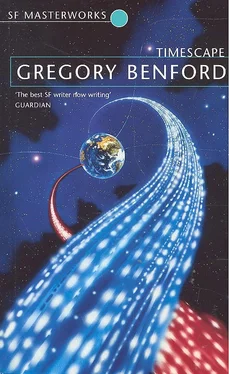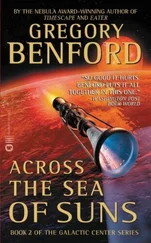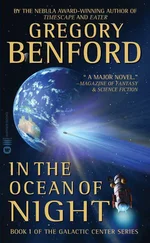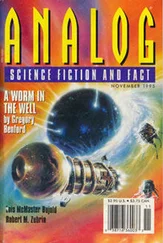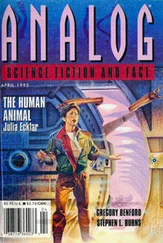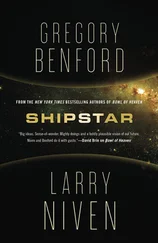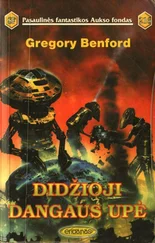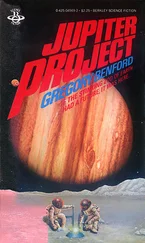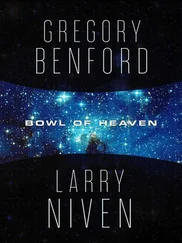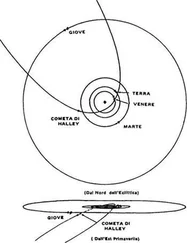“I propose that we not turn ourselves into Low-ells.”
“Publish the spontaneous resonance stuff right away,” Gordon said, trying to think.
“Yes. We have to finish the NSF proposal this week. We can feature the spontaneous resonance material. I can write it up from the notebooks, in such a way that we can use the same manuscript for a paper to Physical Review Letters”
“What good will it do to send it to PRL?” Gordon asked, trying to decide what his reaction was.
“In our NSF proposal we can list the paper in the reference? page as ‘submitted to PRL.’ That puts an earmark on it, says it is work of foremost quality. In fact…” he pursed his lips, judging, peering over imaginary hornrims, “… why not say ‘to be published in PRL’? I am certain they will accept it, and ‘to be published’ carries more weight.”
“It’s not true.”
“It soon will be.” Lakin sat down behind his desk and leaned forward on it, hands clasped together. “And I tell you frankly that without something interesting, something new, the grant is in trouble.”
Gordon looked at him steadily for a long moment. Lakin got up and resumed pacing. “No, of course, it was only a thought. We will say ‘submitted to’ and that will have to do it.” He circumnavigated the office with a measured step, thinking. He stopped before the blackboard with its crude sketches of the data. “A very odd effect, and a credit to its discoverer—you.”
“Isaac,” Gordon said carefully, “I’m not going to drop this.”
“Fine, fine,” Lakin said, taking Gordon’s arm. “Throw yourself into it. I’m sure the business with Cooper will resolve itself in time. You should arrange the date of his doctoral candidacy exam, you know.”
Gordon nodded absently. To set out on a full research program for the thesis, a student had to pass the two-hour oral candidacy examination. Cooper would need some coaching; he tended to freeze up if more than two faculty members were within earshot, a remarkably common effect among students. “I’m glad we have this settled,” Lakin murmured. “I’ll show you a draft of the PRL paper on Monday. Meanwhile—” he glanced at his watch—“the Colloquium is starting.”
• • •
Gordon tried to concentrate on the Colloquium lecture but somehow the thread of the argument kept eluding him. Only a few rows away Murray GellMann was explaining the “Eight-Fold Way” scheme for understanding the basic particles of all matter. Gordon knew he should be following the discussion closely, for here was a genuinely fundamental question. The particle theorists already said Gell-Mann should get the Nobel for this work. He frowned and shifted forward in his seat, peering at Gell-Mann’s equations. Someone in the audience asked a skeptical question and Gell-Mann turned, always smooth and unperturbed, to counter it. The audience followed the exchange with interest. Gordon remembered his senior year at Columbia, when he had first begun attending the Physics Department Colloquia. He had noticed an obvious feature of the weekly meetings, one he never heard talked about. Anyone could ask a question, and when he did all attention of the audience turned to him. If there were several exchanges between lecturer and questioner, all the better. And a questioner who caught the speaker in an error was rewarded with nodding heads and smiles from those around him. All this was clear, and it was doubly clear that no one in the audience prepared for the Colloquia, no one studied for them.
The Colloquium topic was announced a week in advance. Gordon began reading up on the topic and taking down a few notes. He would look up the speaker’s papers, with special attention to the Conclusions section, where authors usually speculated a bit, threw out “blue sky” ideas, and occasionally took indirect slams at their competitors. Then he would read the competitors’ papers as well. This always generated several good questions. Occasionally such a question, innocently asked, could puncture a speaker’s ideas like a stiletto. This would create a murmur of interest in the audience, and inquiring glances toward Gordon. Even an ordinary question, if well delivered, created the impression of deep understanding. Gordon began by calling out questions from near the back. After a few weeks he moved forward. The senior professors in the department always took the first-row seats, and soon he was sitting only two rows behind them. They began turning in their seats to watch as he asked a question. Within a few more weeks he was in the second row. Full professors began to nod to him as they took their seats before Colloquium began. By Christmas Gordon was known to most of the department. He had felt a slight tug of guilt about it ever since, but, after all, he hadn’t done anything except show a keen and systematic interest. If it benefited him, so much the better. He had been a demon for physics and mathematics then, more interested in watching a lecturer pull an analytic rabbit out of a higher mathematical hat than in a Broadway show. Once he spent a whole week trying to crack Fermat’s Last Theorem, skipping lectures to scribble away. Somewhere around 1650, Pierre de Fermat jotted the equation x n+ y n= z n in the margin of his copy of Diophantus’ Arithmetic . Fermat wrote that if x , y, z, and n were positive integers, there were no solutions to the equation for n greater than two. “The proof is too long to write in this margin,” Fermat scribbled. In the 300 years since, no one had been able to prove it. Was Fermat bluffing? Maybe there wasn’t a proof. Anyone who could decide the issue with a mathematical demonstration would be famous. Gordon struggled with the riddle and then, falling behind in classes, gave it up. But he swore that some day he would get back to it.
The Last Theorem had a lot of mathematical beauty in it, but that wasn’t why he had attacked it. He liked solving problems, simply because they were there. Most scientists did; they were early chess players and puzzle solvers. That, and ambition, were the two traits scientists truly had in common, it seemed to him. Gordon mused for a moment on how different he and Lakin were, despite their common scientific interests—and then suddenly sat upright. Heads nearby turned at this quick movement. Gordon ran the conversation with Lakin through his mind, remembering how his talk about the message had been neatly deflected, first into a dodge about Cooper, then the Lowell story, followed by Lakin’s seeming to back down on the “to be published in PRL” business. Lakin got the PRL he wanted, with Gordon and Cooper as coauthors, and Gordon had nothing more than the typescript of his message.
Gell-Mann was describing, in his precise way, a detailed pyramid of particles arranged by mass, spin, and various quantum numbers. It was all a meaningless jumble to Gordon. He reached into his vest pocket—he always put on a jacket for Colloquium, if not a tie as well—and brought out the message. He stared at it a moment and stood up. The audience for Gell-Mann was huge, the biggest draw of the year. They all seemed to be watching him as he worked his way through the forest of knees to the aisle. He walked out of the Colloquium a little unsteadily, the message paper twisted in his hand. Eyes followed him as he went out a side door.
• • •
“Does it make sense?” Gordon said intensely to the sandy-haired man across the desk from him.
“Well, yeah, sort of.”
“The chemistry is legitimate?”
Michael Ramsey spread his palms upward. “Sure, as much as I can follow. These industrial names—’Springfield AD45, Du Pont Analagan 58’—don’t mean anything to me. Maybe they’re still under development.”
Читать дальше
